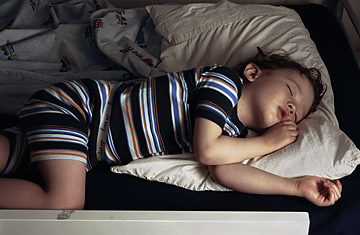
New lessons from 100 years of bedtime battles
(2 of 3)
Consistent over time, too, is the parental belief that kids need a sufficient amount of sleep in order to grow. This, it turns out, is not just a myth. Studies show that about 60% of a child's growth hormone is secreted during sleep. "What we don't know," says Jodi Mindell, associate director of the Sleep Center at the Children's Hospital of Philadelphia, "is if a child doesn't get enough sleep, do you lose that secretion, or does it just shift to daytime?" What's clearer--and a relatively new finding--is that getting too little sleep appears to have a role in obesity. One Israeli study found the effect in babies as young as 6 months.
So if everyone agrees on the value of sleep, why is the recommended amount always in flux? The troubling answer, according to Olds and his colleagues, is that those recommendations are for the most part subjective. "Every so often, a group of blokes get together and say, 'What do you recommend, boys? Should we push it up to 9 hours, 15 minutes?'" says Olds. "It really is like that, honestly. It's an arbitrary public-health line in the sand that people draw."
Plenty of researchers disagree with this--and do so vehemently. Olds' research, which he considered "quite innocuous, something of a cameo study, really," has generated a flurry of controversy, with no fewer than 78 sleep experts and practitioners deriding his scholarship as "a great disservice to children and families" in a Feb. 18 response in Pediatrics. Others have sent him fan mail. People view sleep, he says, as "a lightning rod for their troubles."
There's more than just professional bickering involved here. The fact is, sleep is a notoriously tricky thing to study. Every individual's physiology is different, and just knowing how much sleep a child gets is not the same as knowing how much that child needs. Ten hours may be too little for one 8-year-old and too much for another. And the best research tool yet discovered--asking a child, Do you feel sleepy?--lacks a certain objective rigor.
Still, Canadian research has found that as many as 68% of teens report feeling "really sleepy" between 8 a.m. and 10 a.m., and 23% suspect their grades have suffered as a result. But both adults and kids go through cycles of high and low energy during the day, which can reflect when you last ate, the particular activity you're engaged in at any given moment and a host of other variables. The key metric should not be how many hours of sleep you logged the night before but how many you need to perform at your peak, and there's almost no data about that--in part because of the ethical implications of depriving subjects of sleep and then sending them to work or to school. "We're not saying kids don't need more sleep," says Olds. "My hunch is, yes, they do. But we haven't seen good evidence of that."
